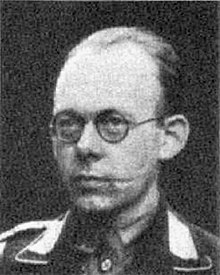Siegmund Kunisch
Siegmund Peter Paul Kunisch (born June 2, 1900 in Mülheim an der Ruhr , † January 22, 1978 in Hagen ) was a German lawyer and politician ( NSDAP ).
Live and act
School time, training and volunteer corps
Kunisch was born as the son of the senior lecturer Prof. Hermann Kunisch and his wife Pauline, geb. Paulus, born on June 2, 1900 in Mülheim an der Ruhr. He attended primary and secondary school in Witten an der Ruhr. In 1918 he was a member of a youth military service. In 1919 he was a member of the volunteer associations set up against the Munich Soviet Republic .
From 1919 to 1923 he studied law in Marburg , Munich and Münster . From 1919 to 1936 Kunisch was a member of the Arminia Marburg fraternity , and in Münster from 1923 to 1925 he was a member of the Völkisch-Soziale bloc , in which he founded a National Socialist student group. He was also a brief member of the German National People's Party (DNVP). During the occupation of the Ruhr in 1923, he was expelled from the Ruhr area by the French occupation government for a year and a half. In 1924 he passed the first state examination in law in Hamm , which he passed with a “sufficient” mark. From 1924 to 1927 Kunisch was a Prussian court trainee. In 1927 he passed the second "major" state examination in law with " fully satisfactory ". Much later, in 1949, the University of Hamburg gave him the degree of a doctorate on the basis of a dissertation on the statute of limitations on prosecution. jur. awarded.
Nazi activities
In 1925 Kunisch joined the National Socialist German Workers' Party (NSDAP) (membership number 41.252), of which he had been a brief member in 1923. A year later he founded the local groups of the NSDAP and the Sturmabteilung (SA) in Witten. In the SA he worked until 1939, most recently as SA Brigadefuhrer (about general). At this time, Kunisch was sent to other associations by the party leadership of the NSDAP in order to bring them to the NSDAP.
In the Reichstag elections of March 1933 , Kunisch was elected as a candidate for constituency 18 (Westphalia South) in the Reichstag , to which he belonged until November of the same year. During this period the Reichstag passed the Enabling Act, among other things .
In April 1933 Kunisch was appointed personal advisor to the Prussian Minister of Justice Hanns Kerrl . He was a ministerial advisor in the Ministry of Justice. He was formally appointed to the Higher Regional Court in September 1933 and Vice-President of the Berlin Local Court in November 1933 . In 1934 Kunisch moved to the Reich Ministry for Science, Education and National Education (REM), where he headed the “Centralamt” until 1939, which was concerned with the ministry's economic, administrative and personnel affairs. In this position he succeeded the retired State Secretary Wilhelm Stuckart . From 1934 to 1936, Kunisch served as acting state secretary. As head of the “People's Education” office in the REM, he had held the rank of ministerial director since 1935. At the Second World War Kunisch took from 1939 to 1945 as a member of the armed forces , most recently as a major part.
In 1950 Kunisch was classified in category IV (followers) by the main denazification committee for the administrative district of Lüneburg.
Employment
Before and after his work as a ministerial official and soldier, Kunisch was a lawyer. After the assessor examination in 1927 he was excluded from the civil service career by the Prussian Ministry of Justice for political reasons. Instead, he earned his living as a lawyer in Wattenscheid (1928) and Hattingen (1930). After the war he worked as a lawyer and notary in Hagen / Westphalia from 1950 to 1978. In 1932 he married Margarete, b. Giese. The marriage had two children.
Fonts
- Hanns Kerrl community camp , Berlin 1934. (together with Roland Freisler and Christian Spieler )
- The statute of limitations on prosecution and its repeal in post-war legislation in Germany , Diss. Hamburg 1949
literature
- Helge Dvorak: Biographical Lexicon of the German Burschenschaft. Volume I: Politicians. Volume 7: Supplement A – K. Winter, Heidelberg 2013, ISBN 978-3-8253-6050-4 , pp. 619-621.
- Michael Grüttner : Biographical Lexicon on National Socialist Science Policy (= Studies on Science and University History. Volume 6). Synchron, Heidelberg 2004, ISBN 3-935025-68-8 , pp. 104-105.
- Joachim Lilla , Martin Döring, Andreas Schulz: extras in uniform: the members of the Reichstag 1933–1945. A biographical manual. Including the Volkish and National Socialist members of the Reichstag from May 1924 . Droste, Düsseldorf 2004, ISBN 3-7700-5254-4 .
- Erich Stockhorst: 5000 people. Who was what in the 3rd Reich . Arndt, Kiel 2000, ISBN 3-88741-116-1 (unchanged reprint of the first edition from 1967).
Web links
- Literature by and about Siegmund Kunisch in the catalog of the German National Library
- Siegmund Kunisch in the database of members of the Reichstag
Individual evidence
- ↑ a b Paul Egon Hübinger: Thomas Mann, the University of Bonn and contemporary history , 1974, p. 481.
- ↑ a b c d e f Folker Schmerbach: The ' Community camp Hanns Kerrl' for trainee lawyers in Jüterbog 1933-1939 , 2008, p. 281.
| personal data | |
|---|---|
| SURNAME | Kunisch, Siegmund |
| ALTERNATIVE NAMES | Kunisch, Siegmund Peter Paul (full name) |
| BRIEF DESCRIPTION | German politician (DNVP, NSDAP), MdR |
| DATE OF BIRTH | June 2, 1900 |
| PLACE OF BIRTH | Mülheim an der Ruhr |
| DATE OF DEATH | January 22, 1978 |
| Place of death | Hagen |
